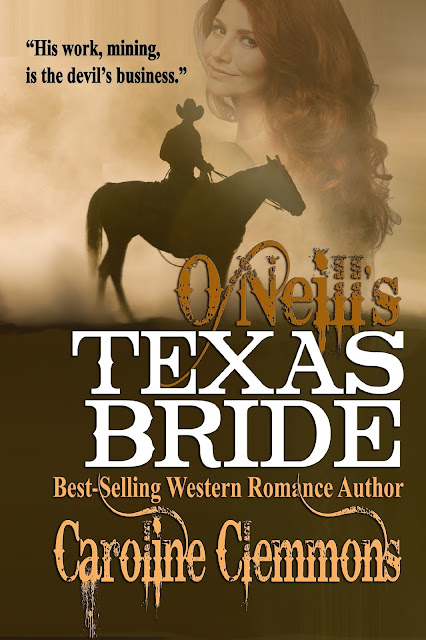My
husband and I don’t subscribe to the Hallmark Channel and watched (via Netflix)
the great series based on Janet Oke’s writing, “When Calls The Heart” set in a
coal town of the Canadian West. Wish I had seen this series before I wrote my
own western romance of coal mining, O’NEILL’S TEXAS BRIDE, McClintocks book
two. My book doesn’t include a Mountie, of course. Mine features a ranch hand hero,
Finn O’Neill, who goes undercover in a lignite coal mine to earn money to buy
his own ranch while he discovers who is sabotaging the mine.
On
second thought, perhaps I’m better off using my research and imagination to
create my own version of a coal town operated by a less than ethical man. The
town in my story is not nearly as neat and pretty as the one in Janet Oke’s
stories. The miners get just as dirty, though.
I
confess that research into coal mining in 1885 Central Texas was difficult. I found
plenty of information on early coal mining from Before The Common Era to today—but
not much on the specific time period and locale I needed. What I did discover
was fascinating in some areas, not so much in others, and downright scary in
places.
I
found the perfect place for my story, the town of Coal Mine, Texas southwest of
San Antonio and near the town of Lytle. In my story, the town is called Lignite
after the type of coal mined there. Also in my story, someone is causing deadly
“accidents” at the mine and the owner wants to determine who is guilty. For
this, he hires my hero, Finn O’Neill.
The beauty of changing the name of the
town in fiction is that the town has whatever buildings I choose and/or need
for the story. Instead of Lytle, in my book the next town is Spencer for the
same reason. That’s one of the fun things about writing historical fiction. The
author gets to build the setting and only has to be true to the period in
customs and dress. I love making up my stories and their settings and I hope
you enjoy reading them!
The
actual town of Coal Mine was on U.S. Highway 81 and the Missouri Pacific line
in southeastern Medina County. Coal mines, worked by as many as 500 people at a
time, precipitated the growth of mining camps in the 1880s. In 1881 the
International-Great Northern Railroad built a rail line from Austin to Laredo
that passed through Lytle southwest of San Antonio.
The
community of Coal Mine developed on this line a mile southwest of Lytle and
just north of the mining camps. The high-grade lignite produced at the mines
was sold to the railroads until the advent of oil-burning locomotives. In 1888
Coal Mine consisted of a store, a bandstand, a main plaza, a dance hall, a
Catholic church, and at least two schools. Hmmm, in my story, Lignite has a
store, both a Catholic and a Protestant church, and one two-room school where
heroine Stella Grace Clayton and her sister Nettie Sue Clayton teach. I
included a lot of mystery in this book, but O’NEILL’S TEXAS BRIDE (as you can
guess from the title) is a romance between Finn O’Neill and Stella Clayton.
Lignite,
often referred to as brown coal, is a soft brown combustible sedimentary rock
that is formed from naturally compressed peat. It is considered the lowest rank
of coal due to its relatively low heat content. It is used almost exclusively
as a fuel for steam-electric power generation. In China, lignite is also mined
for its germanium content.
I
learned a couple of interesting things in my research. Dark black lignite, or
jet, is where the term “jet black” originates. Now the term has more scientific
and precise basis, but the actual term “horse power” began as the amount of
effort it took one horse to lift one container of coal up from the mine shaft
to the ground. Another thing I learned is that I never, ever want to work in a coal
mine. I get claustrophobic in elevators.
O’NEILL’S
TEXAS BRIDE, McClintocks book two, is available at these links:
Amazon bestselling and award winning
author Caroline Clemmons writes western historical and contemporary romances.
Her latest release is OPHELIA, Bride Brigade Book Four. You can keep up with Caroline’s releases by
signing up for her newsletter. Her books are
listed on her website at www.carolineclemmons.com and on her Amazon Author
Page.




A fascinating bit of Central Texas history -- I didn't realize there was coal mining. Thanks for sharing!
ReplyDeleteNancy C